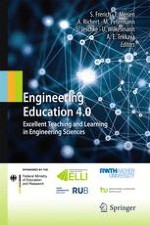2016 | OriginalPaper | Chapter
The Globally Competent Engineer – What Different Stakeholders Say About Educating Engineers for a Globalized World
Authors : Dominik May, Erman Tekkaya
Published in: Engineering Education 4.0
Publisher: Springer International Publishing
Activate our intelligent search to find suitable subject content or patents.
Select sections of text to find matching patents with Artificial Intelligence. powered by
Select sections of text to find additional relevant content using AI-assisted search. powered by
